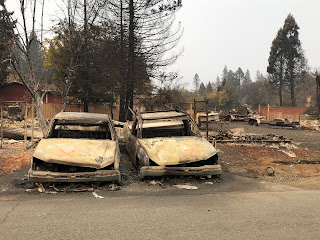A friend of mine who lives in nearby Chico (pop. 93,000), and was warned that evacuation was a strong possibility there too, said the sky was dark as midnight. The fire was so fast moving, and evacuation routes out of Paradise so few and constricted, that many people were forced to leave their cars on the road and try to make it out on foot. Many died. As I write, the death toll stands at 79—making it the deadliest fire in California history—and 700 remain missing.
Our task as SAR was to inspect each burned property, looking for fatalities: long bones, skulls. The officials' goal is to begin opening sections of town up to residents so they can come in and see whether their home is still standing (some 13,000 homes were destroyed), collect valuables (if any remain), and . . . well, mourn. The town of Paradise as they all knew it is no more. Whether and how it will be rebuilt remains to be seen—though during the two days we spent there, PG&E was already hard at work installing new telephone poles, so they, at least, seem to reckon the town will rise again.
Here are some photos I took during my two days there. Me, I stayed close to our Zone 7 CP (command post), helping our group leader, Casey, with "scribing": writing down radio traffic, updating the map. Occasionally I'd accompany fellow volunteer Nadene to liaison with our workers, seeing if they needed anything. I did no searching per se (though I did last year at the Tubbs Fire, so I know what's involved: it's hard work). And thankfully, our teams found nothing in the way of human remains—though that said, it's hard to be sure, with all that devastation. You're basically looking at a couple feet of rubble that used to be a two-story house, and sometimes a fallen metal roof covers much of it. Fire will continue to go into the community to move those roofs aside, and more searchers will take another look. It's a long, difficult process.
(As always, click on the photos to view them large on black.)
 |
| Morning briefing at base camp, a thriving city of several hundred, complete with showers and laundry. |
 |
| Each morning everyone signs in and assignments are made. This is one search zone's sign-up area (and our own Detective Ken Owen there on the right). |
 |
| A couple dozen anthropologists were standing by to inspect any bones that we found. They crafted a crude poster showing what bones and teeth look like after they've been subjected to extreme heat. |
 |
| Our Zone 7 CP: working out of the truck. Deputies Knutsen and Condon, and Nadene. The map was our go-to planning tool. |
 |
| Cell service was awful for ATT. Josh painted a magic circle for Casey to stand in. More seriously, the orange spray paint is what teams used to mark a property as having been inspected. |
 |
| Studying a search section on the map. |
 |
| An exercise bike and swing set |
 | |
| Vehicles are always so eerie, since they're so familiar: melted wheels, exploded belted radials, and bare, burnt metal inside. |
 |
| Children at play no more. One of the things that struck me throughout the burn zone was that the trees were mostly fine—not even charred. Here is a story about the science of that, in the case of this particular fire. |
 |
| Eric, Nadene, and a Madera County volunteer, with the tools of the trade |
 |
| At the end of the shift, the teams marked Xs on the map to indicate the structures they had cleared. These are our National Guardsmen. Awesome group. |
 |
| Lew, Eric, and Nadene |
 |
| With a search section almost complete, Nadene and TJ discuss where to go next |
 |
| This was the Paradise Church of Christ. Adjacent to our staging area. |
 |
| A couple of vintage cars |
 |
| A persimmon tree survived the inferno, making for a spot of beauty |
 |
| The smoky drive back to base camp |
 |
The lake at base camp |
Our team is continuing to head up to Oroville and Paradise over the next week as the searching continues. Five of us are there now. Rain is forecast for the next few days, and it remains to be seen how that will affect the search efforts. It's a sad, hard task, but I feel privileged to have been in a position to assist. It's an act of witnessing, for sure. I wish the very best to all those people who have lost their homes—never mind those who lost friends and loved ones, or who still don't know. I can't imagine going through something like that. Or no: I can begin to, thanks to experiences like this. My heart goes out to the good folks of Paradise, Magalia, Concow, and the other communities devastated by the Camp Fire.












2 comments:
The devastation is so hard to fathom. Thank you for helping, for witnessing, for sharing.
amazing and so sad-
Post a Comment